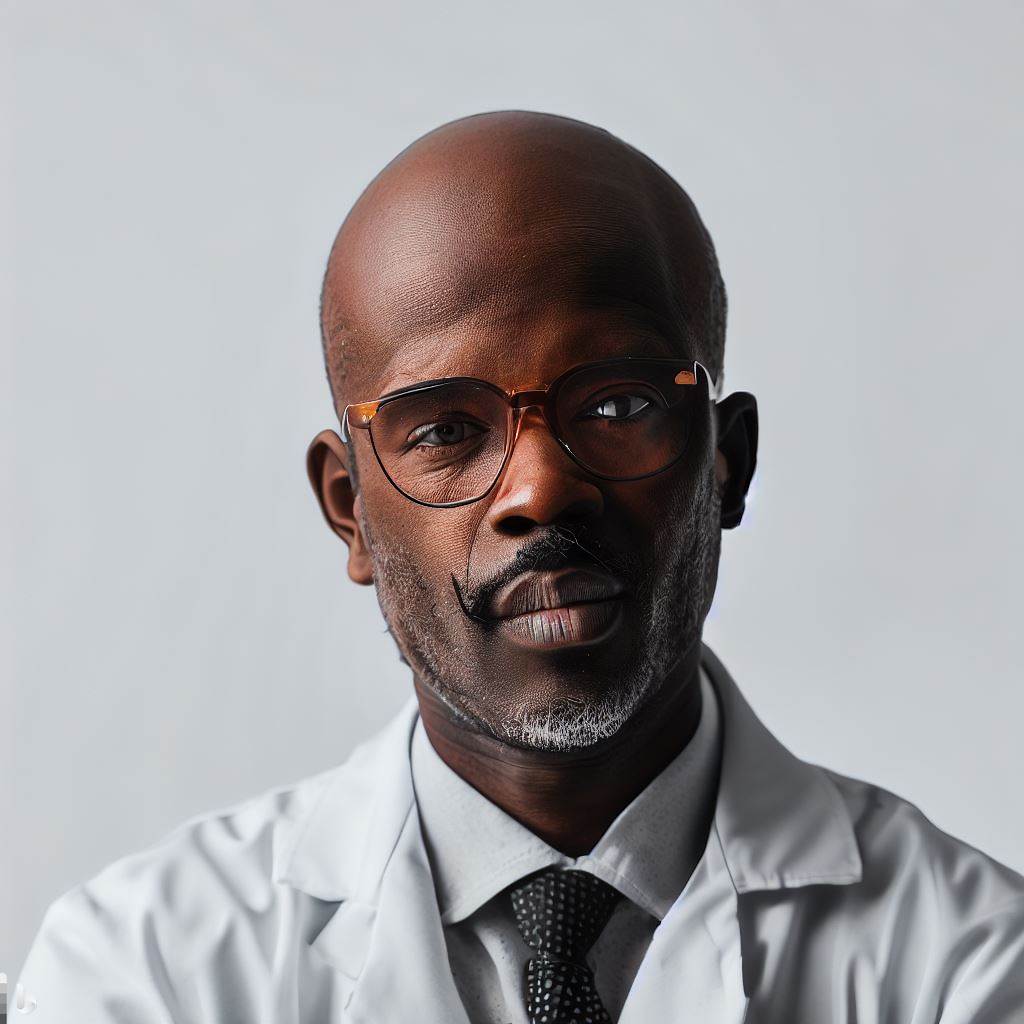Introduction
Speech-language pathology is a field that deals with communication and swallowing disorders.
Speech-language pathology plays a vital role in Nigeria, addressing various communication challenges in the population.
In Nigeria, there is a growing need for speech-language pathology services due to the prevalence of communication disorders.
Speech-language pathologists in Nigeria help individuals overcome speech and language difficulties, enabling them to communicate effectively.
These professionals work with people of all ages, from children with speech delays to adults with aphasia.
In a country as linguistically diverse as Nigeria, speech-language pathology helps preserve and promote cultural and linguistic diversity.
Speech-language pathologists not only diagnose and treat communication disorders but also educate communities about communication health.
Communication disorders can have a significant impact on an individual’s quality of life, affecting their education, employment, and relationships.
By addressing communication challenges, speech-language pathology contributes to a more inclusive society in Nigeria.
Despite the importance of speech-language pathology, there are several challenges faced in its practice in Nigeria.
Limited resources, inadequate funding, and a shortage of qualified professionals hinder the provision of quality speech-language pathology services.
In short, speech-language pathology plays a crucial role in addressing communication challenges in Nigeria.
The field is essential in promoting effective communication, supporting individuals with communication disorders, and creating an inclusive society.
The current state of speech-language pathology in Nigeria
Lack of awareness and understanding
There is a lack of awareness and understanding about speech-language pathology in Nigeria.
Many people are unfamiliar with the profession and its benefits for individuals with communication disorders.
This lack of awareness leads to delayed or inadequate treatment for those in need.
Limited resources and facilities
Nigeria faces significant challenges in providing adequate resources and facilities for speech-language pathology.
There is a lack of specialized equipment and materials needed for assessment and intervention.
Limited funding and infrastructure make it difficult to establish and maintain speech-language pathology centers.
Shortage of qualified professionals
Nigeria has a shortage of qualified speech-language pathologists.
The demand for these professionals exceeds the supply, leading to long waiting lists and limited access to services.
This shortage is due to a lack of training programs and opportunities for professional development.
Cultural and societal factors affecting speech-language pathology practices
Cultural beliefs and practices can influence the perception and acceptance of speech-language pathology.
Some communities may view communication disorders as a result of supernatural causes rather than treatable conditions.
Stigma surrounding communication disorders can discourage individuals and their families from seeking help.
Language diversity in Nigeria also presents challenges in providing appropriate intervention for individuals from various linguistic backgrounds.
Overall, the current state of speech-language pathology in Nigeria is marked by a lack of awareness, limited resources, a shortage of professionals, and cultural and societal factors that affect practices.
These challenges hinder the provision of effective and accessible services to individuals with communication disorders.
Addressing these issues requires increased awareness, investment in resources and facilities, expansion of training programs, and cultural sensitivity in service delivery.
Read: In-depth: Specializations for Physician Assistants in Nigeria
Challenges faced by speech-language pathologists in Nigeria
Language diversity and its impact on assessment and intervention
Speech-language pathologists in Nigeria encounter challenges due to the country’s linguistic diversity, making assessment and intervention more complex.
The vast array of languages spoken in Nigeria pose difficulties in accurately identifying and diagnosing communication disorders.
With over 500 different languages spoken in Nigeria, speech-language pathologists must be knowledgeable in various linguistic patterns and communication styles.
Additionally, the lack of standardized assessment tools for different Nigerian languages further hampers accurate diagnosis and intervention.
Read: Step-by-step Guide to Becoming a Nursing Assistant in Nigeria
Accessibility issues for individuals in remote areas
Another significant challenge faced by speech-language pathologists in Nigeria is the lack of accessibility to services for individuals in remote areas.
Many people living in rural or underserved regions do not have access to trained professionals or speech-language therapy services.
The limited availability of speech-language pathologists in these areas prevents individuals from receiving the necessary intervention and support.
Addressing this challenge requires the implementation of outreach programs and telepractice initiatives to reach those in remote locations.
Stigmatization and misconceptions surrounding communication disorders
Stigmatization and misconceptions surrounding communication disorders contribute to the challenges faced by speech-language pathologists in Nigeria.
There is a prevailing belief that communication disorders are a result of personal or spiritual afflictions.
This misconception leads to individuals seeking traditional healers or religious leaders instead of seeking professional help.
Speech-language pathologists must work to educate the public and raise awareness about the scientific nature of communication disorders.
Limited funding for research and development
The limited funding for research and development in Nigeria poses a significant obstacle for speech-language pathologists.
Without adequate funding, speech-language pathologists face challenges in carrying out research to improve assessment and intervention techniques.
Insufficient funds also hinder the development of innovative tools and technologies that could enhance therapy outcomes.
Advocacy efforts are necessary to secure more funding and support for research in the field of speech-language pathology in Nigeria.
Difficulty in providing continual professional development and training
Continual professional development and training opportunities are scarce for speech-language pathologists in Nigeria.
Limited resources and access to specialized training programs make it challenging for professionals to further enhance their skills.
Continual professional development is crucial for staying abreast of new research, techniques, and evidence-based practices in the field.
Efforts should be made to establish training programs and collaborations with international experts to provide ongoing professional development for speech-language pathologists in Nigeria.
In essence, speech-language pathologists in Nigeria face various challenges in providing effective assessment and intervention for individuals with communication disorders.
The linguistic diversity of the country, limited accessibility in remote areas, stigmatization, funding constraints, and lack of professional development opportunities are significant hurdles to overcome.
Addressing these challenges requires a multi-faceted approach, including the development of standardized assessment tools, increased funding for research, and the establishment of training programs for professionals.
Read: Challenges and Triumphs: Nigeria’s Radiation Therapists

Uncover the Details: Medical Practice in Nigeria: Ethics and Regulations
Solutions and Initiatives to Address the Challenges
Expanding public awareness through education and advocacy
- Providing free or low-cost screening events to identify communication disorders early and encourage early intervention.
- Advocating for the inclusion of speech-language pathology services in public healthcare programs.
- Collaborating with schools and community centers to establish speech-language pathology clinics and outreach programs.
- Engaging with policymakers to advocate for policies that support the advancement of speech-language pathology in Nigeria.
Increasing funding and resources for speech-language pathology services
- Advocating for government allocation of sufficient funds to support the development and expansion of speech-language pathology services.
- Seeking partnerships with private organizations and benefactors to fund research, training, and infrastructure development.
- Establishing grant programs to provide financial support for individuals pursuing speech-language pathology education.
- Collaborating with insurance providers to secure coverage for speech-language pathology services.
- Conducting public awareness campaigns to highlight the importance of speech-language pathology and its impact on individuals’ lives.
Enhancing collaboration between professionals, universities, and governmental organizations
- Creating platforms for regular communication and knowledge sharing between speech-language pathologists and other healthcare professionals.
- Establishing partnerships between universities and speech-language pathology clinics to improve training programs and practical experience.
- Developing collaborations with governmental organizations to influence policy-making, regulation, and resource allocation.
Implementing telepractice and technological advancements for outreach
- Utilizing telepractice to offer remote assessment, therapy, and consultation services to individuals living in remote areas.
- Embracing technological advancements to develop innovative tools and software for assessment, treatment, and communication enhancement.
- Providing training and support to speech-language pathologists to ensure competence in using telepractice and technology effectively.
- Conducting research to explore the effectiveness and feasibility of telepractice and technological interventions in the Nigerian context.
Establishing partnerships with international organizations and professionals for support and training
- Collaborating with international organizations specializing in speech-language pathology to exchange knowledge and resources.
- Inviting international professionals to provide training, mentorship, and capacity-building workshops for Nigerian speech-language pathologists.
- Facilitating international internships and exchange programs to expose Nigerian speech-language pathologists to different approaches and practices.
- Seeking funding from international sources to support research projects, conferences, and professional development opportunities.
By implementing these solutions and initiatives, Nigeria can overcome the challenges in speech-language pathology and improve the quality of services available to individuals with communication disorders.
It requires a collective effort from various stakeholders, including professionals, universities, governmental organizations, and international partners.
Read: Continuing Education Opportunities for MRI Techs in Nigeria
Importance of addressing the challenges
Addressing the challenges of speech-language pathology in Nigeria is crucial for several reasons.
Positive impact on individuals with communication disorders
By addressing the challenges, individuals with communication disorders can receive the necessary support and interventions to improve their communication skills.
This can significantly enhance their overall quality of life, allowing them to better express themselves and participate in social interactions.
Proper speech-language pathology services can also help individuals with communication disorders achieve their personal and professional goals.
Contributions to educational advancements and academic achievements
Addressing the challenges in this field can contribute to educational advancements and academic achievements in Nigeria.
With proper speech-language pathology services, students with communication disorders can receive appropriate support within the educational system.
This can enable them to fully participate in classroom activities, understand instructions, and improve their academic performance.
Furthermore, addressing these challenges can help create an inclusive educational environment that supports the learning needs of all students.
Social and economic benefits for individuals, families, and society as a whole
Addressing the challenges of speech-language pathology in Nigeria can have significant social and economic benefits.
Individuals who receive effective intervention can improve their communication skills, leading to better job prospects and increased employability.
This, in turn, can contribute to poverty reduction and economic growth in the country.
Improved communication skills can also enhance social interactions, enabling individuals to establish meaningful relationships and actively participate in their communities.
Additionally, families of individuals with communication disorders can benefit from access to appropriate speech-language pathology services.
These services can provide them with the necessary tools and strategies to effectively communicate and support their loved ones, fostering stronger family dynamics.
Addressing the challenges of speech-language pathology in Nigeria also benefits society as a whole.
A society with improved communication skills can foster better understanding, empathy, and inclusivity, leading to social cohesion and harmony.
Furthermore, reducing communication barriers can enhance access to various services, including healthcare and legal support, ensuring equal opportunities and justice for all individuals.
In fact, addressing the challenges of speech-language pathology in Nigeria is of utmost importance.
It not only has a positive impact on individuals with communication disorders but also contributes to educational advancements, academic achievements, and social and economic benefits for individuals, families, and society as a whole.
By recognizing the significance of this field and implementing effective strategies, Nigeria can work towards creating a more inclusive and prosperous society.
Read: How to Kickstart Your Career as a Radiation Therapist in Nigeria
Conclusion
In the realm of Speech-Language Pathology, Nigeria faces significant challenges that demand immediate attention.
This blog delves into the pressing issues that hinder the progress of this vital field.
Nigeria’s Speech-Language Pathology landscape grapples with multifaceted obstacles that necessitate urgent solutions.
The dearth of resources, limited access to specialized training, and inadequate awareness about communication disorders present formidable challenges.
To pave the way for a brighter future, concerted efforts are imperative. Further research is indispensable to bridge the gaps in knowledge and practices.
Advocacy plays a pivotal role in garnering support and recognition for speech-language pathology’s significance in society.
Initiatives that foster collaboration between healthcare institutions, educators, and policymakers will propel the field towards growth and advancement.
Publish Your Professional Profile, Business or Brand
Showcase your expertise, gain trust, and boost visibility instantly on Professions.ng.
Publish NowThis blog embarks on a journey to explore these hurdles and advocate for change.
By shedding light on the challenges and potential remedies, we aim to inspire a transformative impact on Speech-Language Pathology in Nigeria.
Join us as we navigate through the intricacies, untangle the barriers, and strive to empower a promising future for this crucial discipline.
Together, we can bring about a positive transformation in the lives of countless individuals with communication disorders.




